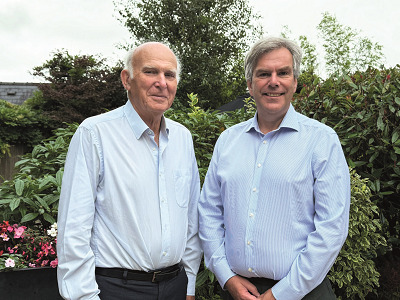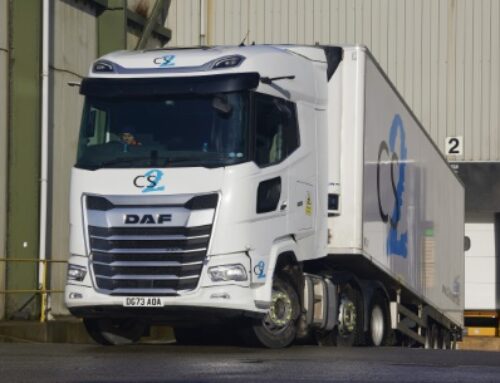Government to fund feasibility study into autonomous HGVs
 eFreight Autonomous, a consortium of CV and automotive technology experts, has secured funding and support from the British government to explore the role that autonomous HGVs could play on UK roads from a fleet operational perspective.
eFreight Autonomous, a consortium of CV and automotive technology experts, has secured funding and support from the British government to explore the role that autonomous HGVs could play on UK roads from a fleet operational perspective.
The support comes via the CAM (Connected and Automated Mobility) Pathfinder Feasibility Studies Competition which is being delivered by the national innovation agency, Innovate UK, and Zenzic, the body established by government and industry to champion connected and automated mobility.
The project aims to evaluate current technology and to understand the direction of future developments, thereby identifying potential use cases, and assessing commercial viability as well as the infrastructure and legal frameworks that would be needed to implement autonomous trucking in the UK.
eFreight Autonomous is led by EV charging specialist Voltempo Group, which developed the electric HGV megawatt charging system. Other consortium members include Berkeley Coachworks, which designed the lightweight Berkeley Bulldog e-trailer, and Connected Places Catapult, a data and research partner.
Work on the project is expected to begin this summer, and results delivered in early 2027. At the project’s end, the consortium will produce reports and briefing documents for government and industry, outlining a roadmap for future use of autonomous HGVs, which will identify potential risks, opportunities, timescales and costs.
In tandem with the project, Berkeley Coachworks aims to develop autonomous vehicles at its Pembrokeshire manufacturing site and test track. Once the reports are published, eFreight Autonomous plans to examine the prospect of creating real-world trials on UK roads with autonomous HGVs, which it says could potentially be operational by the end of 2027.
Sir Vince Cable, the former business secretary who greenlit the UK’s first driverless technology tests in 2014, chairs the consortium. He said: “We are delighted to have been selected to take part in the CAM Pathfinder feasibility study to research, evaluate and help shape the future of UK freight transport from the perspective of fleet operators.
“Autonomous technology offers a chance to unlock innovation across transport, strengthen the UK supply chain and rethink logistics that are cleaner, greener and better for local communities and better for business.”

Sir Vince Cable (left), chair of the eFreight Autonomous consortium, with Voltempo CEO Michael Boxwell
Michael Boxwell, CEO of Voltempo, said: “Autonomous vehicles are already in everyday use in parts of China and the US, and trials here in the UK, such as self-driving shuttles in Birmingham and autonomous buses in Scotland, are paving the way for wider adoption by 2027 with the full implementation of the Automated Vehicles Act.
“For freight operators working on tight margins, this is a chance to understand this transformational technology, help shape its future rollout and explore the real cost-saving opportunities it can deliver for the UK supply chain through improved efficiencies.”
Mark Cracknell, programme director at Zenzic, said: “We are thrilled to announce the eFreight Autonomous project, spearheaded by Voltempo, Connected Places Catapult and Berkeley Coachworks, as one of the fourteen exciting CAM Pathfinder Feasibility Studies taking place across the UK.
“The deployment of Connected and Automated Mobility solutions holds incredible promise – enhancing accessibility, reducing emissions, and fostering a transport network that is both reliable and inclusive. The eFreight Autonomous project will serve as a pivotal example in showcasing those benefits.
“We are looking forward to working with the project consortia as they further develop their business case, demonstrate the commercial readiness of the service, and provide vital insight into the opportunities presented by the deployment of CAM solutions in regions throughout the UK.”
eFreight Autonomous is just one of 14 projects being supported through the competition, exploring connected and autonomous mobility technology in a variety of contexts.
These include passenger transport, one study into which is being led by Transport for London, technology provider Fusion Processing, bus operator Metroline and manufacturer Alexander Dennis. It will trial automated No User In Charge (NUIC) driving technology in two live London bus depots.
Over a ten-month period, the consortium intends to evaluate how automated driving systems can achieve safe and efficient manoeuvring within depots, for example from cleaning bays to charging points and overnight parking positions.
The project will utilise Fusion Processing’s CAVstar Automated Drive System (ADS) on demonstration buses to assess how it can provide improved operation in space-constrained London depots. A remote operator interface will also be developed, allowing close vehicle monitoring and if necessary, intervention.
Jim Hutchinson, CEO of Fusion Processing, said: “We are excited to collaborate with Transport for London and our partners Alexander Dennis and Metroline on this forward-thinking initiative.
“No User In Charge automation has the potential to deliver immediate improvements in depot safety and efficiency. It also helps lay the foundation for the wider adoption of autonomous vehicle technology. This project is a significant step forward in adapting our ADS platform for real-world electric vehicle operations and dense urban environments.”
Sean O’Shea, CEO of Metroline, added: “As an operator we are committed to embracing new technologies that can further enhance safety at our garages, as well as working closely with our workforce to manage an inclusive integration into our operations. We look forward to participating in this innovative project to discover how this can help to support our workforce and safety culture at our garages.”
The competition forms part of a wider CAM Pathfinder programme, which last month benefited from a further £150 million funding package from the UK government. A total of £18 million has already been deployed this year by Pathfinder across 37 projects, aimed at addressing the challenges of bringing CAM vehicles to market.












